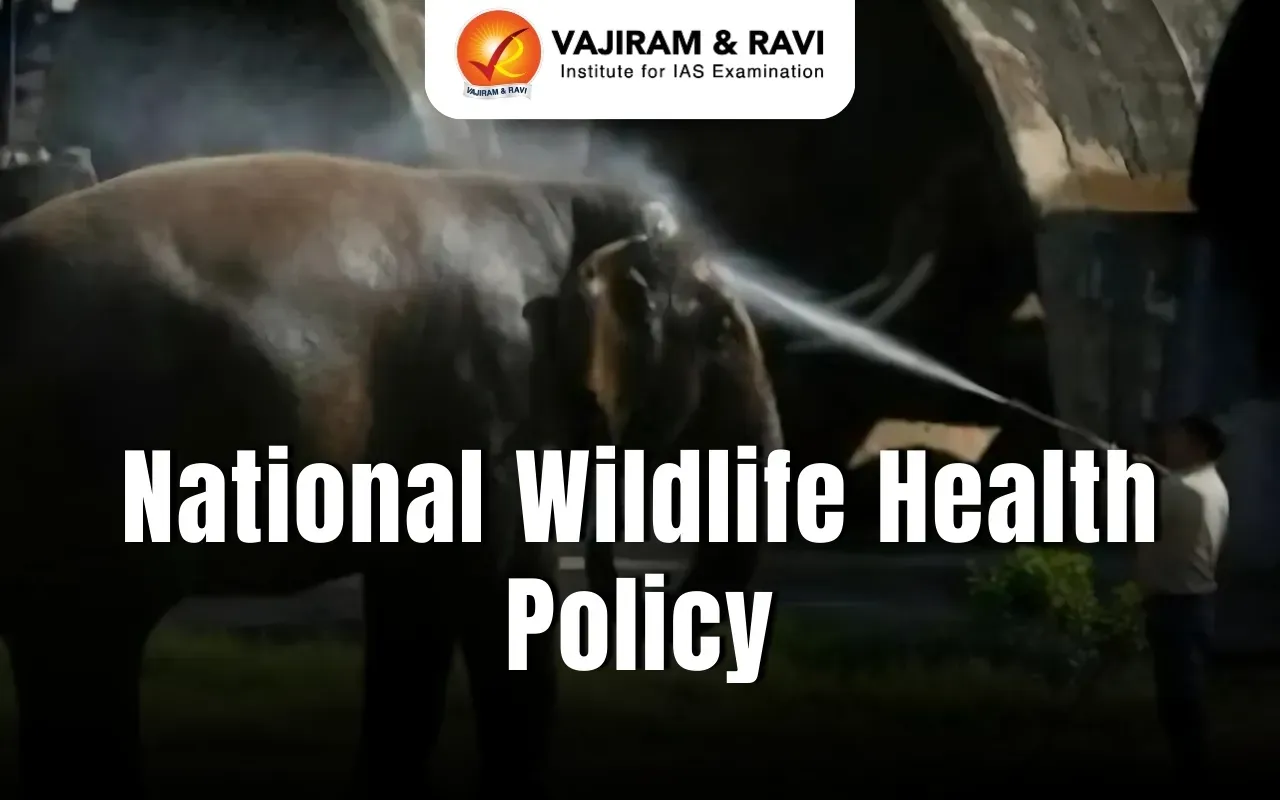What’s in Today’s Article?
- National Wildlife Health Policy Latest News
- National Referral Centre for Wildlife (NRC-W)
- National Wildlife Health Policy (NWHP) Under Review
- National Wildlife Health Policy FAQs
National Wildlife Health Policy Latest News
- Five years after the Covid-19 pandemic, the Centre is reviewing a draft National Wildlife Health Policy (NWHP) to strengthen wildlife disease surveillance and research.
- The policy proposes integrated monitoring systems, new diagnostic laboratories, and enhanced research efforts to track and prevent zoonotic diseases.
National Referral Centre for Wildlife (NRC-W)
- Zoonotic diseases account for 60% of emerging infectious diseases worldwide, with 72% originating from wildlife.
- India has experienced several localized but severe outbreaks, such as Kyasanur Forest Disease and Nipah virus.
- These incidents highlight the urgent need for efficient disease monitoring in wild animal populations and continuous health surveillance of captive wild animals in zoological institutions across the country.
- Against this backdrop, Centre has established the NRC-W.
NRC-W: An Ambitious Wildlife Health Initiative
- The NRC-W has been established in Junagadh, Gujarat.
- The Central Zoo Authority (CZA) under the Union Environment Ministry has prepared blueprints for its development, focusing on emerging infectious diseases, wildlife disease surveillance, and outbreak management.
Need for NRC-W: Addressing Zoonotic Threats
- The establishment of NRC-W is crucial due to the rising emergence and re-emergence of zoonotic diseases.
- Out of 1,407 human pathogens, 816 are zoonotic, posing a significant health risk.
- NRC-W will strengthen disease detection, research, and safe handling of animals, preventing spillovers from wildlife to humans.
Advanced Research and Surveillance Facilities
- NRC-W will be equipped with state-of-the-art investigation and surveillance technology to detect diseases in both animals and humans.
- It will also support skill-based training, data analytics, and policy development to enhance wildlife health management.
- NRC-W will bridge the gap between wildlife health, human health, and livestock programs, ensuring a holistic approach to One Health.
Collaborative Approach for Wildlife Health
- NRC-W will function in collaboration with national and international institutes to enhance disease surveillance, research, and wildlife conservation.
- The CZA will act as the nodal agency, ensuring coordination between zoos and wildlife health programs across India.
National Wildlife Health Policy (NWHP) Under Review
- Five years after the Covid-19 pandemic, the Centre is reviewing an interim draft of the National Wildlife Health Policy (NWHP) to enhance wildlife disease monitoring and research.
- The policy proposes integrated surveillance systems, new diagnostic labs, and cross-sectoral collaborations to address zoonotic disease risks.
- It aims to mitigate risks of wildlife-origin pathogens, like SARS-CoV-2, by improving early detection and response mechanisms.
Alignment with One Health Approach
- Over 60% of emerging infectious diseases in humans originate from animals.
- In this context, the NWHP aligns with the National One Health Mission, which integrates efforts across human, animal, and environmental health sectors.
- Monitoring wildlife, both in the wild and in captivity, has become crucial for pandemic preparedness.
Key Stakeholders and Policy Formulation
- The Central Zoo Authority (CZA) is leading the policy drafting, with consultations driven by the Principal Scientific Adviser’s office and support from IIT Bombay.
National Referral Centre for Wildlife (NRC-W) as a Key Hub
- The National Referral Centre for Wildlife (NRC-W), inaugurated by PM Modi in Junagadh, Gujarat, will be a central authority for investigating wildlife mortalities, disease outbreaks, diagnostics, and treatments.
Bridging Information Gaps and Cross-Sectoral Coordination
- Currently, wildlife disease surveillance is fragmented across different ministries and independent research efforts.
- The policy aims to integrate data from the Ministry of Environment, Ministry of Agriculture, and Department of Animal Husbandry to ensure better coordination.
Establishment of Wildlife Health Databases
- The policy proposes a National Wildlife Health Database and a Wildlife Health Information System to centralize real-time and historical data.
- These will complement existing systems like the National Animal Disease Referral Expert System to predict and prevent outbreaks.
Satellite Diagnostic Labs and Community Engagement
- The policy recommends setting up satellite diagnostic labs near key forest habitats to improve wildlife disease detection and response.
- It also emphasizes community engagement, such as vaccination programs for cattle near national parks, to prevent disease spillover from domestic to wild animals.
National Wildlife Health Policy FAQs
Q1. What is India’s National Wildlife Health Policy?
Ans. It is a framework to strengthen wildlife disease surveillance, zoonotic risk management, and research for better public health security.
Q2. Why is NRC-W important for wildlife health?
Ans. NRC-W will serve as India’s central hub for investigating wildlife mortalities, disease outbreaks, and zoonotic research.
Q3. How does NRC-W enhance zoonotic disease prevention?
Ans. It integrates surveillance, diagnostics, and research to detect and prevent wildlife-to-human disease transmission effectively.
Q4. What role does the One Health approach play in this policy?
Ans. It aligns human, animal, and environmental health efforts to track, manage, and prevent future pandemics like COVID-19.
Q5. How will NRC-W collaborate with other organizations?
Ans. NRC-W will work with national and international institutes to enhance disease research and wildlife health conservation.
Last updated on June, 2025
→ UPSC Notification 2025 was released on 22nd January 2025.
→ UPSC Prelims Result 2025 is out now for the CSE held on 25 May 2025.
→ UPSC Prelims Question Paper 2025 and Unofficial Prelims Answer Key 2025 are available now.
→ UPSC Calendar 2026 is released on 15th May, 2025.
→ The UPSC Vacancy 2025 were released 1129, out of which 979 were for UPSC CSE and remaining 150 are for UPSC IFoS.
→ UPSC Mains 2025 will be conducted on 22nd August 2025.
→ UPSC Prelims 2026 will be conducted on 24th May, 2026 & UPSC Mains 2026 will be conducted on 21st August 2026.
→ The UPSC Selection Process is of 3 stages-Prelims, Mains and Interview.
→ UPSC Result 2024 is released with latest UPSC Marksheet 2024. Check Now!
→ UPSC Toppers List 2024 is released now. Shakti Dubey is UPSC AIR 1 2024 Topper.
→ Also check Best IAS Coaching in Delhi
























